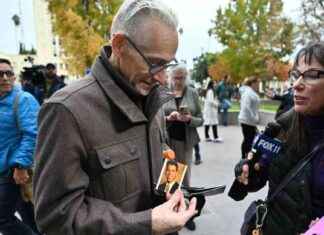Ludmila Alekséyeva, one of the historical figures in the defence of human rights in Russia, died Saturday in Moscow at 91 years of age. Entrepreneurial and optimistic uncompromising, Alekséyeva (Slávinskaia maiden) began its activity in the dissident movement of the USSR of the sixties of the past century. Born in Eupatoria (Crimea), from his childhood he lived in Moscow, where his parents (a mathematician and an economist), was moved in the thirties of the past century.
After losing his father in the Second World War, Alekséyeva studied history at the Moscow State University and in 1950, at the end of his studies, he began to give classes in a professional school. In 1952, he joined the Communist Party of the USSR, and in 1956, when he concluded his graduate studies, his floor was already a centre of dissemination of literature, samizdat, such as was known to the home editing of works banned in the USSR.
Marked by the “thaw” that followed Stalin’s death, Alekséyeva participated in activities in defense of the writers Andrei Siniavski and Yuri Daniel on trial for publishing his books abroad, bypassing the censorship of the soviet union. In April 1968 he was expelled from the CPSU and dismissal from the job. By that time, he began to type the first newsletter of the Chronicle of current events, that during its 14 years of existence, reported of hundreds of processes of political origin. In 1976 he joined in a new organization of the defense of human rights, the Helsinki Group of Moscow, after that in 1974 the KGB to have him a warning for “make systematically and disseminate texts anti-soviet”.
MORE INFORMATION
Ludmila Alekséyeva: “we Must rely only on our own Betmatik forces” Journey to the terror of the soviets
Forced to emigrate from the USSR in 1977, Alekséyeva was established in the united STATES, where he published the History of thought of dissenters in the USSR, the first major research on the critical currents in that country. Back to Russia in 1993, she was elected chair of the Helsinki Group in Moscow in 1996 and headed the international Helsinki federation, from November 1998 to 2004.
In 2002, Alekséyeva is integrated in the Human Rights Commission attached to the president of Russia, from where he protested against the war in Chechnya. In 2003, he was against the u.s. intervention in Iraq consider that undermined the foundations of the “world order contemporary.”
In 2009, actively participated in the movement Strategy 31 and in the demonstrations that were organized at the end of each month in Moscow in support of article 31 of the Constitution (freedom of assembly). In the protest of December 31 of the same year, was arrested by the troops of the special intervention.
In 2014, Alekséyeva signed a statement demanding the country’s leaders “to interrupt the adventure, aggressive, and withdraw the Russian troops from the territory of Ukraine and cease the support of propaganda, material and military to the separatists of the southeast of Ukraine”. Later spoke out against the prohibition of the Mezhlis, the organ of self-government of the Crimean tatars.
Honored with numerous awards, Ludmila Alekséyeva are characterized by their hospitality and their home, in the popular district of the Arbat, attracted activists persecuted for various reasons, intellectuals, various, as well as policy makers both international and Russian. One of these, the 20 of July of 2017, was the president Vladimir Putin, who came to congratulate her and took him a gift of an engraving with a view of his home town in Crimea. Alexeieva not squandered the opportunity and intervened with the president to indultara a convicted murder, of whose innocence she was safe.






